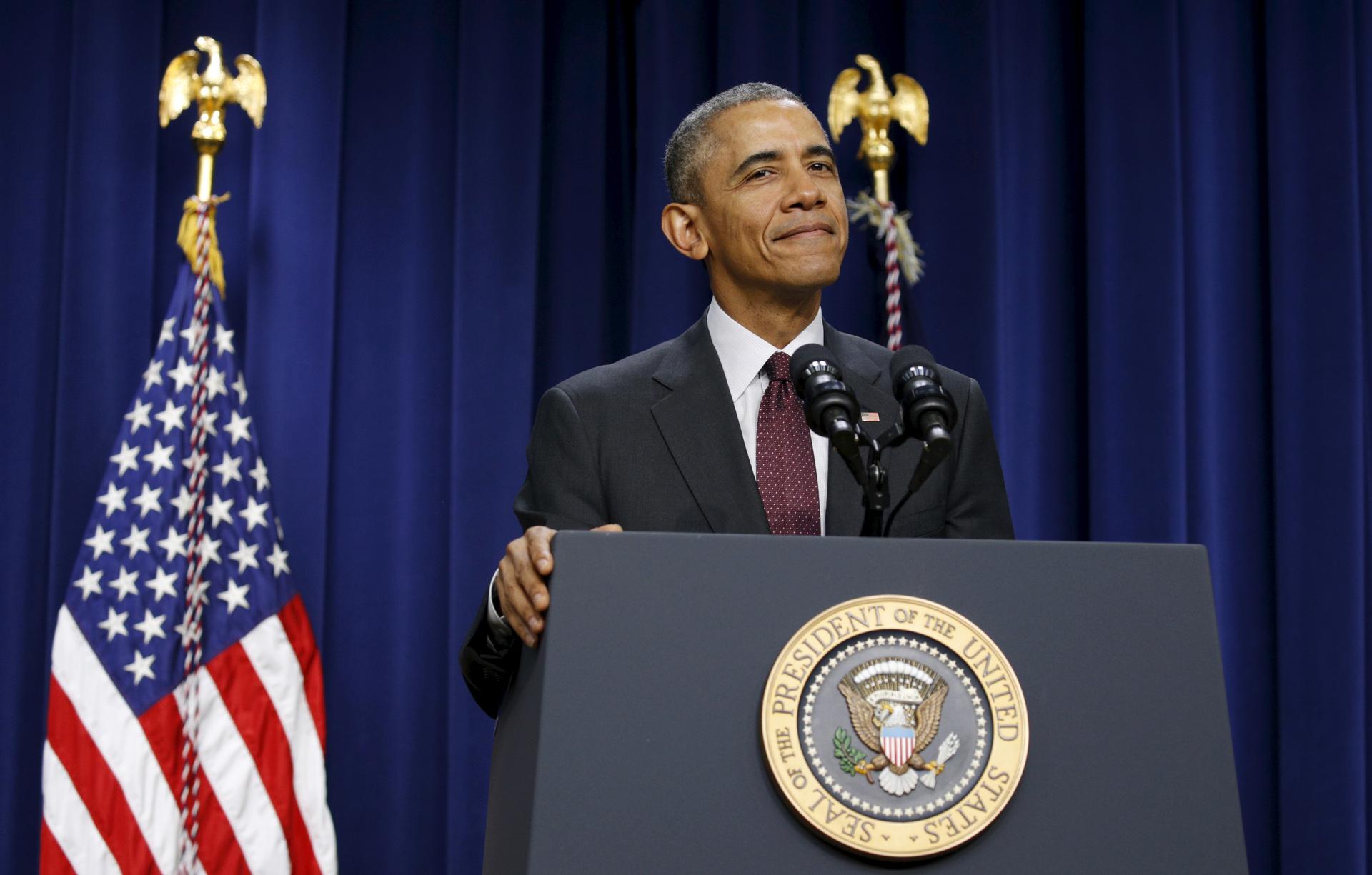How President Obama has changed and evolved his way of talking about race in America
U.S. President Barack Obama pauses while speaking at an event honoring the 7th anniversary of the signing of the Lilly Ledbetter Fair Pay Act, at the White House in Washington January 29, 2016.
Will the most symbolic position in the United States — the office of the president — be forever changed now that Barack Obama has held the office?
Academic and author Michael Eric Dyson says President Obama represents the pinnacle of US politics and the very foundation of America's dark history with race. As Dyson points out, James Baldwin would refer to this weight as "the burden of representation." It's a burden Dyson explores in his new book, "The Black Presidency: Barack Obama and the Politics of Race in America," which will be released today.
Though he’s made great inroads, Dyson says that the issue of race has been difficult for President Obama.
“In his public speech, he’s begun to acknowledge [racism] — the speech at Selma for the 50th anniversary; his speech, or his sermon, if you will, for the funeral of Clementa Pinckney, the murdered minister and politician [killed by Dylann Roof],” Dyson says. “Race became a central category of his analysis and forced Obama to use the brilliance he has on race, finally, in application to public policy, and to speak from his bully pulpit to articulate a vision that could be helpful to the nation.”
When he was running for preisdent, then-Senator Barack Obama gave an impassioned speech on race in America, entitled “A More Perfect Union.” The speech was partially a response to controversy stirred up by Reverend Jeremiah Wright, Obama’s former pastor, who criticized the prison industrial complex and American racism in a 2003 sermon that the media publicized in 2008.
"The government gives [black Americans] the drugs, builds bigger prisons, passes a three-strike law and then wants us to sing 'God Bless America,'” Rev. Wright said. “God damn America for treating our citizens as less than human.”
Though the president has always known that race is a critical issue in America, Dyson says Obama’s 2008 speech represented an “impossible balancing act.”
“He always knew, but he figured in terms of his modus operandi — his strategy was to minimize its impact, even when he gave that Jeremiah Wright speech,” Dyson says. “On the one hand, he had to reassure white folks that he’s not some raging black man who has privately nursed resentment about white America. And on the other hand, he can’t diss his pastor because black people hold their pastor right up there next to mama — it’s mama, then pastor. So he can’t be seen as engaging in some very unscrupulous practices towards the man who nurtured his own spiritual rebirth.”
With his 2008 speech, Dyson says Obama made a false equivalency between modern white anger and black anger of the past. He adds that Obama has also “shunned” the black rage and anger of the present in order to keep white supremacists and obstructionists at bay.
“By the time he gets to Charleston, all bets are off — you can’t avoid it, you can’t minimize it, you can’t put it on the backburner, and you’ve got to speak to it in a way that will be uplifting and helpful, and doesn’t simply, if you will, lecture black America,” Dyson says.
However, even with his address in Charleston, Dyson argues that Obama was still being too reserved on the issue of race.
“I believed in the man, and I still do,” Dyson says. “I think he’ll go down as one of the greatest presidents we’ve had, but the issue of race will not win him those plaudits, because of his reticence; because of his understandable hesitation to engage the issue of race.”
Though he wanted to move on from the issue of race early in his tenure, Dyson says that it was always a subject he would have to confront head on.
“Every great president has been forced to do so — from Lincoln down to LBJ,” he says. “Those who are our most outstanding leaders were forced into a situation that they then embraced and ran with it. I think Barack Obama has come late to the game, but he’s made some interesting strides in the aftermath.”
As Obama prepares to leave office, Dyson says America’s racial pendulum is again swinging. He believes both Hillary Clinton or Bernie Sanders can move the nation forward when it comes to public policy and racism in America, but he says the former candidate would offer something that has never been seen in US history.
“I think that the nation will continue to make progress if a Hillary Clinton, for example, is elected as the first female president,” he says. “It won’t make as big a difference as it otherwise would have made because Barack Obama has cleared the hurdle for difference by being the first black president. He has cleared the path for her in some ways, and opened the door for a potential 16-year stretch where a white male was not at the helm of the American government. That alone, symbolically speaking, is quite extraordinary.”
This story first aired as an interview on PRI's The Takeaway, a public radio program that invites you to be part of the American conversation.
Every day, reporters and producers at The World are hard at work bringing you human-centered news from across the globe. But we can’t do it without you. We need your support to ensure we can continue this work for another year.
Make a gift today, and you’ll help us unlock a matching gift of $67,000!
